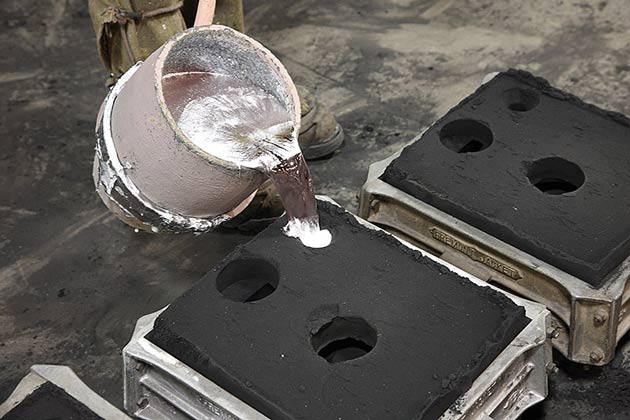Excitement About Stahl Specialty Company
Excitement About Stahl Specialty Company
Blog Article
The 8-Minute Rule for Stahl Specialty Company
Table of ContentsThe Facts About Stahl Specialty Company UncoveredThings about Stahl Specialty CompanyThe 10-Minute Rule for Stahl Specialty CompanyThe Basic Principles Of Stahl Specialty Company What Does Stahl Specialty Company Mean?
The refined distinction depends on the chemical web content. Chemical Contrast of Cast Aluminum Alloys Silicon advertises castability by lowering the alloy's melting temperature and enhancing fluidity during casting. It plays a critical duty in permitting elaborate molds to be filled accurately. In addition, silicon adds to the alloy's stamina and wear resistance, making it important in applications where durability is crucial, such as automotive components and engine components.It additionally enhances the machinability of the alloy, making it much easier to refine into finished products. This way, iron adds to the total workability of aluminum alloys. Copper boosts electric conductivity, making it helpful in electric applications. It also enhances corrosion resistance and includes to the alloy's overall stamina.
Manganese adds to the strength of aluminum alloys and enhances workability. It is commonly utilized in functioned aluminum products like sheets, extrusions, and accounts. The presence of manganese aids in the alloy's formability and resistance to splitting during construction procedures. Magnesium is a light-weight element that supplies stamina and effect resistance to light weight aluminum alloys.
It permits the production of light-weight components with exceptional mechanical buildings. Zinc boosts the castability of light weight aluminum alloys and assists control the solidification process throughout casting. It improves the alloy's stamina and firmness. It is typically located in applications where detailed forms and great details are needed, such as ornamental spreadings and certain automobile components.
The Only Guide for Stahl Specialty Company
Due to the fact that aluminum-silicon alloys have excellent casting residential properties, high gas buildings, straightforward procedures, and superb corrosion resistance, aluminum-silicon alloys are most commonly made use of in the die-casting market in the house and abroad. At the same time, aluminum-silicon alloys are also reasonably early and widely acknowledged alloys developed and utilized in die-casting. After constant research and enhancement, a lot of the existing global mainstream aluminum-silicon alloys have been finalized and are absolutely nothing more than A356, A360, A380, ADC12, B390, and A413.
The key thermal conductivity, tensile stamina, yield toughness, and elongation differ. Select appropriate basic materials according to the performance of the target item created. Amongst the above alloys, A356 has the greatest thermal conductivity, and A380 and ADC12 have the lowest. The tensile limitation is the opposite. A360 has the most effective yield toughness and the highest possible prolongation rate.

Getting The Stahl Specialty Company To Work
In precision casting, 6063 is fit for applications where intricate geometries and top notch surface finishes are extremely important. Instances consist of telecommunication rooms, where the alloy's remarkable formability enables for streamlined and cosmetically pleasing styles while maintaining architectural integrity. Similarly, in the Illumination Solutions market, precision-cast 6063 elements create elegant and reliable illumination components that call for elaborate forms and excellent thermal efficiency.
(https://anotepad.com/note/read/k3dhi827)
The A360 exhibits premium elongation, making it ideal for complicated and thin-walled parts. In accuracy casting applications, A360 is fit for sectors such as Customer Electronic Devices, Telecommunication, and Power Devices.

In accuracy spreading, aluminum 413 beams in the Consumer Electronics and Power Devices markets. It's typically made use of to craft intricate parts like smartphone real estates, camera bodies, and power tool cases. Its accuracy is amazing, with tight tolerances as much as 0.01 mm, making certain flawless product assembly. This alloy's premium corrosion resistance makes it an excellent choice for outdoor applications, making certain durable, durable items in the stated industries.
The Best Strategy To Use For Stahl Specialty Company
The aluminum alloy you choose will significantly influence both the spreading process and the homes of the last product. Since of this, you should make your decision very carefully and take an informed strategy.
Figuring out the most appropriate aluminum alloy for your application will certainly suggest weighing a vast array of attributes. These relative alloy qualities comply with the North American Pass Away Spreading Association's guidelines, and we have actually divided them into 2 groups. Casting Foundry. The first classification addresses alloy attributes that affect the production process. The second covers attributes affecting the buildings of the end product.
The alloy you select for die casting straight impacts several elements of the casting process, like just how easy the alloy is to deal with and if it is prone to casting problems. Hot splitting, also referred link to as solidification splitting, is a regular die casting defect for light weight aluminum alloys that can cause internal or surface-level splits or fractures.
6 Simple Techniques For Stahl Specialty Company
Certain aluminum alloys are much more vulnerable to hot cracking than others, and your selection should consider this. Another usual issue located in the die spreading of light weight aluminum is die soldering, which is when the cast adheres to the die walls and makes ejection tough. It can harm both the actors and the die, so you need to search for alloys with high anti-soldering homes.
Rust resistance, which is currently a noteworthy feature of light weight aluminum, can differ considerably from alloy to alloy and is a necessary particular to consider depending on the ecological conditions your product will be revealed to. Put on resistance is one more residential property commonly looked for in light weight aluminum products and can separate some alloys.
Report this page